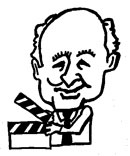The Human Stain (-)
This is a real mystery. No, not the plot, but why a movie with two fine actors like Anthony Hopkins and Nicole Kidman just did not work, particularly since it was based on a book by a fine writer, Philip Roth. But it did not.
I think it happened thus because the storyline, although not novel, should have been provocative, but wasn’t. It could be called boring for much of the nearly two hour movie. The story has been done a number of times: Coleman Silk (Anthony Hopkins) looks white but is the son of clearly black parents. His mother referred to him at one point when he told her he was marrying a white woman — whom he has not told he is black — that he is “white as snow.” He is played as a youth by Wentworth Miller. His sister and brother are clearly black in complexion. His mother is superbly played by Anna Deavere Smith. His father, Mr. Silk (Harry Lennix), austere and proud of his family, worked on a Pullman dinner car and was called in days not too long ago “boy” by some passengers.
There are flashbacks to Coleman’s pre-college days, but we first learn of his race from his boxing coach who tells him not to divulge his race to someone he is to be introduced to. The movie opens with a voice over telling us how Coleman had become the dean of the Athena College where he was teaching — a great achievement because, says the voiceover, Coleman is Jewish. He is falsely accused at the college of being a racist and having used the word “spooks” in describing two black students. The word means ghosts, but also has a secondary meaning that is racist. Coleman’s intent was to call attention to the fact that the two students never showed up for class.
Learning of the controversy, Coleman’s wife dies of a heart attack. He quits and is soon caught up with a young woman, Faunia Farley (Nicole Kidman) who holds three jobs, attendant at a post office, cleaning lady at the college and farm girl who milks cows in exchange for a room. The affair is shocking to some, he being in his 70s and referred to by Faunia’s former husband Lester (Ed Harris), a dangerous psycho Vietnam veteran, as “that old Jew.” After quitting as college dean, Coleman becomes friendly with Nathan Zuckerman (Gary Sinise), a writer, and confides in him about his love affair and using Viagra but doesn’t tell him of the racial secret held now for fifty years.
It all seems so sad that with so much to work with, there was no passion that would stir the audience. Interestingly, the period of the love affair takes place during the Bill Clinton impeachment hearings. The audience was small on the weekend of the opening because the reviews were really bad. Knowing that, I went nevertheless because I thought that Anthony Hopkins and Nicole Kidman were worth seeing. I was wrong.
Shattered Glass (+)
The movie received mixed reviews from the critics. I have mixed feelings about it, but on balance, recommend it. It is a docudrama, meaning based on a true story. Therein lies the problem. Apparently, the director and scriptwriters took no liberties with the story so as to make it more dramatic, but reported it literally. The dialogue is uninspired, and there are no dramatic high points as so often occurs in a docudrama with an explanation in the crawl that the script is based on a true story but that dramatic license was taken.
Now to the story. It covers the period at the New Republic when a young writer, Stephen Glass (Hayden Christensen) is working with a young staff (in their twenties) as a reporter under the direction of the managing editor, Michael Kelly (Hank Azaria). Yes, the same Michael Kelly who was killed in Iraq earlier this year. He was fired from the New Republic by the publisher, Marty Peretz, and replaced by Charles Lane (Peter Sarsgaard). Glass writes a story for the magazine about computer hackers. Forbes Magazine, distressed that their reporter did not get the story, on checking the alleged facts, finds major problems and an inability to contact the named people in the article. To cut to the chase, we learn that Stephen Glass has totally fabricated the story as he did two dozen others. The editor, Lane, fires him risking the insubordination of the staff which likes Glass.
It is all interesting and of course reminiscent of what occurred at The New York Times recently with its reporter Jason Blair who did something similar, but less egregious. Blair made up incidents, but I don’t recall that he created wholly false stories. In any event, Glass, like Blair, was fired and we are told Glass is now a lawyer practicing in New York City. Whatever happened to the character committees that those seeking admission to the bar had to convince of one’s integrity and character? If the dialogue and drama had been enhanced, the movie would have been more interesting. But it wouldn’t have been totally true, and another fraud thereby committed on the public.
I’m glad that they stuck with the facts.
– Ed Koch
Reader Services


































